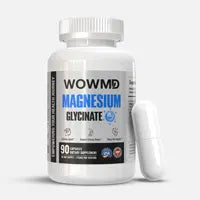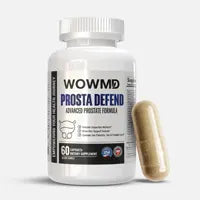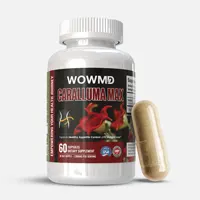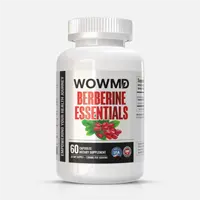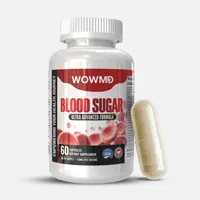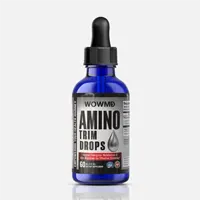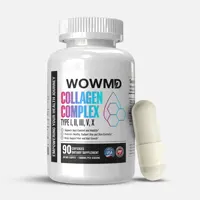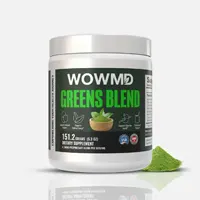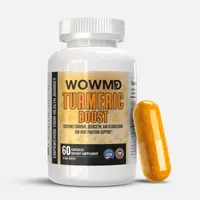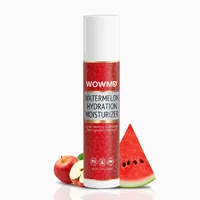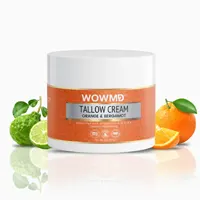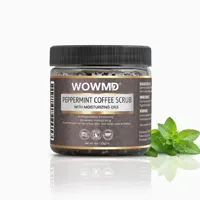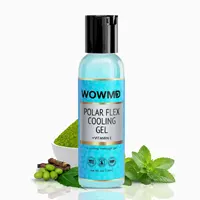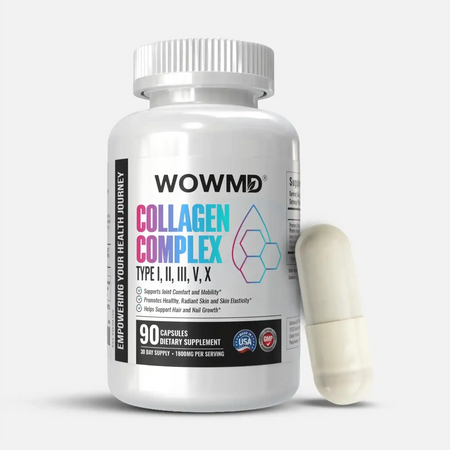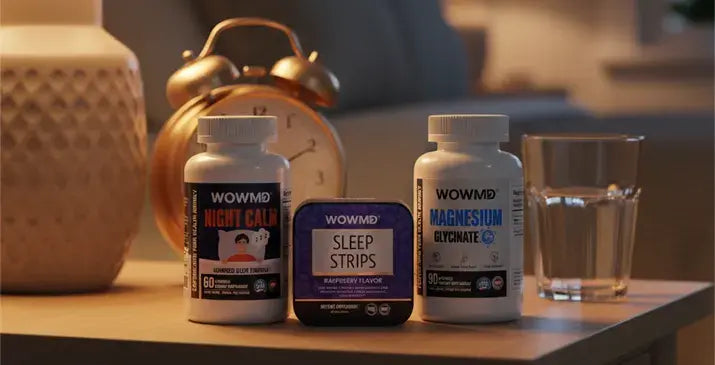
Magnesium for Muscle Health and Recovery
Learn how magnesium helps with muscle recovery by reducing soreness, promoting healing, and supporting energy levels for optimal muscle health.
Advertiser Disclosure: WOWMD independently vets all recommended products. If you purchase a featured product, we may be compensated. Learn why you can trust us.
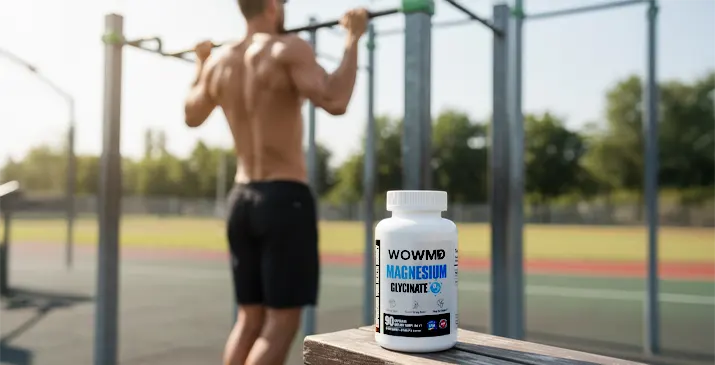
Did you know? Almost 50% of Americans consume less magnesium than recommended, leading to higher risk of muscle cramps, fatigue, and poor recovery.
If you want to improve your muscle health, getting enough magnesium is one of the best options. This essential mineral plays a key role in muscle contraction and relaxation, helping to promote healing, speed up recovery, and lessen pain.
The body does not produce magnesium naturally, so we have to derive it from foods like spinach, avocado, pumpkin seeds, legumes, and almonds, or take it in the form of supplements. While many people take magnesium for muscle recovery, it also supports bone, metabolic, nerve, and heart health.
In this article, we examine the role of this mineral in muscle health, explore the best forms of magnesium for muscles, discuss dosing recommendations, and provide tips for safe supplementation.
“This article is expert-reviewed and medically fact-checked*.”
TL;DR
- Q: How does magnesium help recovery? Relaxes muscles, reduces pain, boosts energy.
- Q: Best magnesium for recovery? Magnesium citrate, sulfate, glycinate, chloride, malate.
- Q: How does magnesium reduce soreness? Reduces inflammation, enhances muscle healing, improves sleep.
- Q: Daily magnesium requirement? Men: 400-420 mg, Women: 310-320 mg.
- Q: How to safely supplement magnesium? Consult doctor, avoid high doses, take with meals.
>> WOWMD Magnesium Glycinate – gentle & highly absorbable – designed for USA athletes and adults [Shop Now]
Did you know?
- DYK? Magnesium is required for 300+ enzyme reactions, including muscle repair.
- DYK? Low magnesium is linked with restless leg syndrome and poor sleep quality.
- DYK? Athletes in hot climates (Florida, Texas, Arizona) lose more magnesium via sweat.
The Role of Magnesium in the Muscles
Magnesium supports overall muscle health and plays a central role in their contraction and relaxation - including the heart[1]. How does magnesium relax muscles? The mineral calcium binds to muscle protein sites, modifying their structure to cause muscles to contract. Magnesium also binds to the same proteins, blocking calcium after contraction to relax the muscles.
 How Magnesium Supports Muscle Health
How Magnesium Supports Muscle Health
In addition, this essential mineral supports the muscles in other ways:
- Promotes Protein Synthesis - Magnesium helps activate protein synthesis, essential for muscle growth and development.
- Balances Electrolytes - One of the functions of magnesium is to maintain levels of the minerals calcium, potassium, and sodium, promoting the optimal electrolyte balance required for healthy muscle function.
- Prevents High Lactic Acid - This mineral helps prevent an excess, buildup of lactic acid in the muscles, helping to ease tension.
- Boosts ATP Production - Magnesium stimulates the mitochondria in the cells to boost ATP production, increasing cellar energy to support muscle contraction and relaxation.
How Does Magnesium Help Muscle Recovery?
 How Magnesium Works in Muscles Contraction vs Relaxation
How Magnesium Works in Muscles Contraction vs Relaxation
When you exercise or engage in strength training, muscles become constricted, and sometimes they can remain tense afterward and cause discomfort. Does magnesium help muscle recovery? Magnesium is essential in relaxing the muscles after they contract, so it plays a central role in muscle recovery after exercise.
In addition to speeding up healing and recovery, magnesium may help ease muscle pain after training and boost performance. Magnesium has antioxidant properties, helping to lower oxidative stress to repair damage to muscle tissue, and it also exerts anti-inflammatory effects that reduce swelling and help relieve discomfort and pain.
A study of college-aged adults published in the Journal of Strength and Conditioning Research highlighted the link between magnesium and muscle pain reduction[2]. The researchers concluded that magnesium supplementation relieved soreness, enhanced recovery, and improved perceived exertion after a bench-pressing session.
How else does magnesium help muscle recovery?
- Sleep Quality: Evidence indicates that magnesium may help improve sleep quality by lowering cortisol levels, improving neurotransmitter synthesis, and boosting melatonin levels. Solid rest is essential for proper muscle recovery and healing[3].
- Increases Vitamin D Levels: Low levels of vitamin D can lead to weakness and pain in muscles because it helps regulate calcium and protein synthesis. Magnesium activates increased levels, helping to ease pain and weakness and speed up healing.
💡 DYN? Magnesium has a direct impact on sleep quality. A key component of muscle recovery. Studies show that magnesium helps regulate melatonin production, the hormone that controls your sleep-wake cycle.
Learn More: Best Magnesium for Anxiety and Sleep
Dr. Susan Kleiner, PhD, RD, CSSD – Sports Nutritionist
Stated that” "Magnesium is often overlooked in athletic recovery, but it’s essential for muscle contraction and relaxation. Ensuring adequate magnesium intake can reduce post-exercise soreness and optimize performance.”
Best Magnesium Types for Muscle Recovery
| Magnesium Form | Benefits | Uses |
|---|---|---|
| Magnesium Sulfate (Epsom Salt) | Best for muscle relaxation and tension relief | Dissolve in warm bath water for full-body muscle relief |
| Magnesium Chloride | Easily absorbed by the body | Can be taken as capsules or topical sprays |
| Magnesium Citrate | Quickly absorbed | Best taken orally in tablet or powder form |
| Magnesium Malate | Supports energy production and muscle metabolism | Ideal for oral supplementation |
| Magnesium Glycinate | Gentle on the digestive system | Take orally as a supplement for muscle recovery |
Magnesium exists in many different forms, and the benefits of each and its absorption ability vary. Which magnesium is best for muscle recovery? Organic forms of magnesium (read: contains carbon and created by living organisms) are better absorbed than inorganic forms (read: not related to plants or animals). The more absorbable organic forms include:
- Magnesium Sulfate - Also called Epsom salt, magnesium sulfate is arguably the best form of magnesium for muscle recovery. Adding it to a bath for a soak helps ease muscle tension, detoxify the body, decrease inflammation, and speed up muscle healing.
- Magnesium Chloride - Magnesium chloride is absorbed easily by the body, and it is also the easiest to find in both oral and topical forms. Whether you take capsules or use a spray, lotion, or cream, it helps ease muscle pain and tension and detoxify the body.
- Magnesium Citrate - Which magnesium is best for muscle cramps? Bound to citric acid, this magnesium form is most easily absorbed by the body. It supports nerve transmission to the muscles, helping to ease pain after a workout, and is the top form to relieve cramping and spasms.
- Magnesium Malate - This form of magnesium, bound to malic acid, supports energy production and muscle metabolism. It helps to decrease fatigue and is a good form of magnesium for muscle pain.
- Magnesium Glycinate - This is magnesium combined with the amino acid glycine, which plays a role in relaxation and improving sleep quality. It helps ease muscle tension and improve recovery and is least likely to cause digestive upset.
- Magnesium Glycinate - Magnesium bound to the amino acid taurine is also well-absorbed. This magnesium-taurine combination has additive effects on improving hypertension and overall cardiovascular health. In particular, taurine hasbeen shown to improve recovery from exercise-induced muscle damage [4]. Some forms of the less bioavailable inorganic forms of magnesium include magnesium oxide, magnesium chloride, and magnesium sulfate (Epsom salt). Because of their poor absorption (relative to organic forms), they are more appropriately used as laxatives and/or antacids. Magnesium sulfate (Epsom salt) is often added to a bath for a soak to help ease muscle tension, detoxify the body, decrease inflammation, and speed up muscle healing. However, effective absorption of magnesium via the skin has yet to be proven scientifically[5].
>> Struggling with post-workout fatigue or cramping? WOWMD Magnesium Glycinate is the key to better muscle health and recovery [Buy Now]
Daily Magnesium Requirements: How Much Do You Need For Optimal Recovery?
While topical forms are available, magnesium is more bioavailable for muscle health in oral supplement form. You can also derive it from the best foods for muscle recovery like nuts, seeds, legumes, leafy greens, yogurt, quinoa, yogurt, milk, bananas, spinach, tofu, soy milk, and and fatty fish (e.g., salmon, halibut).
How much magnesium do you need daily? According to the National Institutes of Health, the recommended daily intake for adults is as follows[6]:
- Adult Men - 400-420 mg
- Adult Women - 310-320 mg
- Pregnant Women - 350-400 mg
- Lactating Women - 310-360 mg
Are You Getting Enough Magnesium?
While serious magnesium deficiency is not common in the U.S., the National Health and Nutrition Examination Survey concluded that 48% of Americans take in low levels of this essential nutrient[6].
Factors that can impact magnesium uptake and increase your chances of low levels include medical conditions like type 2 diabetes, kidney disease, and gastrointestinal disorders, and taking medications like proton-pump inhibitors, antibiotics, and diuretics.
How do you know if your levels are too low? If you suspect you are deficient in magnesium, see your doctor for a blood test and to discuss options. Some of the symptoms of low magnesium levels may include:
- Muscle cramps or pain
- Fatigue
- Tingling or numbness
- Decreased appetite
- Nausea or vomiting
- Irregular heartbeat
- Seizures
Magnesium Supplementation: Tips for Safety
While it's important to meet the daily magnesium requirement, taking in too much of this nutrient daily can lead to side effects like stomach cramps, diarrhea, nausea, lethargy - and weaker muscles. When taking magnesium for muscles, follow these tips to ensure safe supplementation:
- Consult with your physician before taking a magnesium supplement, especially if you have a health condition or take medication.
- Magnesium supplements with more than 350 mg of elemental magnesium may cause diarrhea and other side effects in some people. This often depends on the form of magnesium. It is best to take magnesium in divided doses, especially when supplementing with amounts greater than 350 mg.
- Magnesium can be taken with or without food. Nevertheless, taking magnesium supplements with a meal rather than on an empty stomach can minimize the risk of side effects in some people with sensitive digestive systems.
- Inorganic magnesium forms are more likely to lead to side effects, in particular magnesium carbonate, magnesium sulfate, and magnesium oxide.
💡 DYN?According to the NIH, 48% of U.S. adults have inadequate magnesium intake
Magnesium Supplement: Checklist for Buyers
- Look for Non-GMO and Gluten-Free options for better overall health.
- Ensure it's Third-Party Tested to guarantee the product's purity and potency.
- Check Dosage Recommendations – Ideal for daily use with no more than 350 mg / Per day.
- Review Customer Feedback for product effectiveness.
- Verify the Product’s Ingredients – Ensure no fillers or artificial additives are included.
- Review Return Policy.
Customer Testimonials
- “Magnesium Glycinate helps me unwind and relax my muscles. It’s become part of my nightly routine for stress relief. Works better than expected!” Derek C.
- “I feel way less tense, and my muscles chill out more since I started taking these.” Harris M.
- “I like the way these capsules have helped me reduce muscle cramps, especially after workouts.” Zane L.
- “Perfect for sore muscles.” Andrew P.
>>Feeling fatigued or dealing with muscle cramps? Recharge your body with WOWMD Magnesium Glycinate for better recovery and relaxation [Shop Now]
Conclusion
Magnesium is an essential mineral that supports muscle health, helps contract and relax the muscles, and improves healing. Does magnesium help muscle recovery? Supplementing this essential mineral as part of your post-workout routine helps repair muscles, ease pain and inflammation, and improve sleep for better overall recovery.
If you’re considering taking a magnesium supplement, consult with a healthcare practitioner to have your levels checked and discuss optimal dosage and timing.
Struggling with post-workout cramps or fatigue? WOWMD Magnesium Glycinate – made in the USA – is clinically formulated for gentle absorption, faster recovery, and deeper sleep. [Order Now]
Learn More About Magnesium and Your Health:
FAQs
Our Top Picks
About WOWMD Staff
See Our Editorial Policy > Meet Our Health Expert NetworkThe WOWMD Staff category features a diverse team of writers, each bringing specialized knowledge in areas such as nutrition, fitness, wellness, and more. Articles in this category benefit from insights provided by multiple experts. All content is peer-reviewed and regularly updated to ensure compliance with our editorial standards.
You May Also Like
Popular Stories
- The Best Beef Tallow Products for Radiant Skin: A 2026 Guide
- Holy Basil : Ayurveda’s Herb for Balance, Immunity & Everyday Calm
- Best Gel Moisturizers for Hydration & Skin Care in 2026
- 7 Best Effective Supplements for Improving Bladder and Prostate Health in 2026
- 4 Best Cooling Gels for Skin and Body: Instant Refreshment and Relief
- 4 Best Hyaluronic Acid Serums for Skin Hydration - Tested & Reviewed
References
WOWMD follows strict sourcing guidelines to ensure the accuracy of its content, outlined in our editorial policy. We use only trustworthy sources, including peer-reviewed studies, qualified experts, and information from top institutions.
- The Central Role of Magnesium In Skeletal Muscle: From Myogenesis to Performance: https://air.unimi.it/bitstream/2434/1117513/2/mrh-351319-79182-the_central_role_of_magnesium_in_skeletal_muscle_from_myogenesis_to_performance-241506-u.pdf
- Effects of Magnesium Supplementation on Muscle Soreness and Performance: https://pubmed.ncbi.nlm.nih.gov/33009349/
- The Role of Magnesium in Sleep Health: a Systematic Review of Available Literature: https://pubmed.ncbi.nlm.nih.gov/35184264/
- Taurine in sports and exercise: https://pmc.ncbi.nlm.nih.gov/articles/PMC8152067/
- Myth or Reality—Transdermal Magnesium?: https://pmc.ncbi.nlm.nih.gov/articles/PMC5579607/
- Magnesium: https://ods.od.nih.gov/factsheets/Magnesium-HealthProfessional/
Evidence Based Research
This WOWMD content has been reviewed, as well as checked for facts, so as to guarantee the best possible accuracy.
We follow a strict editorial policy, especially related to the sources we use. Our articles are resourced from reputable online pages, with research drawn from academic institutions and peer-reviewed studies. You can click on the numbers in the parentheses (1, 2, etc.) and check out those references.
The feedback form on this page can be used to report content that is not accurate, up-to-date or questionable in any manner.
We do NOT intend for the information presented through our articles to replace the medical relationship with a qualified physician, nor does it represent specialized advice.


 Alpha Man Power Pack
Alpha Man Power Pack All-Day Fat Burn Trio
All-Day Fat Burn Trio Better Immunity Bundle
Better Immunity Bundle  Calm & Sleep Duo
Calm & Sleep Duo Cognitive Health & Vision Combo
Cognitive Health & Vision Combo Complete Weight Loss Bundle
Complete Weight Loss Bundle Core Vitality Trio
Core Vitality Trio Energy Booster Combo
Energy Booster Combo Focus Fuel Trio
Focus Fuel Trio Glow & Balance Duo
Glow & Balance Duo Health Balance Trio
Health Balance Trio Heart Care Bundle
Heart Care Bundle Joint Health Support Combo
Joint Health Support Combo Men's Immunity & Prostate Health Bundle
Men's Immunity & Prostate Health Bundle Metabolism Boost Duo
Metabolism Boost Duo Natural Skin Care Bundle
Natural Skin Care Bundle Peak Performance Duo
Peak Performance Duo Relax & Recharge Duo
Relax & Recharge Duo Skin Detoxification Bundle
Skin Detoxification Bundle Smart Energy Trio
Smart Energy Trio Stress + Energy + Wellness Combo
Stress + Energy + Wellness Combo  Total Burn Ignite Trio
Total Burn Ignite Trio Total Harmony Pack
Total Harmony Pack Workout Supplements Combo
Workout Supplements Combo